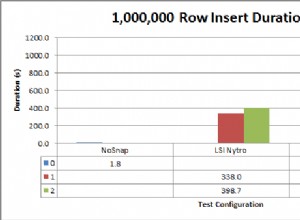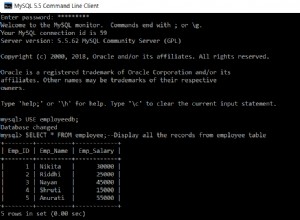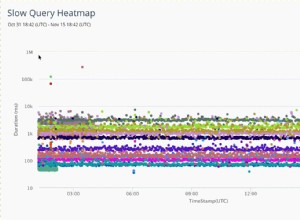Poiché John Woo ha chiarito che non è direzionale, ecco la mia nuova risposta:
select *
from msgsList
where (least(msg_from, msg_to), greatest(msg_from, msg_to), msg_time)
in
(
select
least(msg_from, msg_to) as x, greatest(msg_from, msg_to) as y,
max(msg_time) as msg_time
from msgsList
group by x, y
);
Uscita:
| MSG_ID | MSG_FROM | MSG_TO | MSG | MSG_TIME |
------------------------------------------------------------------------
| 1 | 1 | 2 | hello | January, 23 2010 17:00:00-0800 |
| 5 | 1 | 3 | me too | January, 23 2012 00:15:00-0800 |
| 6 | 3 | 2 | hello | January, 23 2012 01:12:12-0800 |
Per questo input:
create table msgsList
(
msg_id int,
msg_from int,
msg_to int,
msg varchar(10),
msg_time datetime
);
insert into msgslist VALUES
(1, 1, 2, 'hello', '2010-01-23 17:00:00'), -- shown
(2, 2, 1, 'world', '2010-01-23 16:00:00'),
(3, 3, 1, 'i am alive', '2011-01-23 00:00:00'),
(4, 3, 1, 'really', '2011-01-22 23:15:00'),
(5, 1, 3, 'me too', '2012-01-23 00:15:00'), -- shown
(6, 3, 2, 'hello', '2012-01-23 01:12:12'); -- shown
Demo SQLFiddle
Se ANSI SQL è la tua tazza di tè, ecco il modo per farlo:https://sqlfiddle .com/#!2/0a575/19
select *
from msgsList z
where exists
(
select null
from msgsList
where
least(z.msg_from, z.msg_to) = least(msg_from, msg_to)
and greatest(z.msg_from, z.msg_to) = greatest(msg_from, msg_to)
group by least(msg_from, msg_to), greatest(msg_from, msg_to)
having max(msg_time) = z.msg_time
) ;




